 The logarithm of any number to a given base is the index of the power to which the base must be raised in order to equal the given number. The logarithm of any number to a given base is the index of the power to which the base must be raised in order to equal the given number.  Complete School Algebra - Page 476by Herbert Edwin Hawkes, William Arthur Luby, Frank Charles Touton - 1919 - 507 pagesFull view Complete School Algebra - Page 476by Herbert Edwin Hawkes, William Arthur Luby, Frank Charles Touton - 1919 - 507 pagesFull view - About this book
 | Electronic journals - 1902 - 232 pages
...told that " the logarithm of a number is the exponent of the power to which a certain number, taken as the base, must be raised in order to equal the given number." The definition is purely formal. Probably the beginner has never seen a proof for the existence even... | |
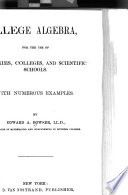 | Edward Albert Bowser - Algebra - 1888 - 868 pages
...INTEREST AND ANNUITIES. LOGARITHMS. 202. Definitions. — The Logarithm of a number is the exponent of the power to which another number, called the base, must be raised to equal the given number. Thus, if a* = N, x is called the logarithm of Nto the base a. This is usually... | |
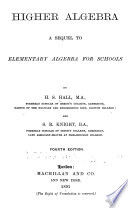 | Henry Sinclair Hall, Samuel Ratcliffe Knight - Algebra - 1891 - 606 pages
...LOGAKITHMS. 199. DEFINITION. The logarithm of any number to a given base is the index of the power to -which the base must be raised in order to equal the given number. Thus if a' — N, x is called the logarithm of N to the base a. Examples. (1) Since 34=81, the logarithm... | |
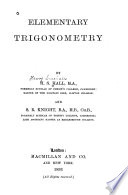 | Henry Sinclair Hall, Samuel Ratcliffe Knight - Plane trigonometry - 1893 - 434 pages
...LOGARITHMS. 151. DEFINITION. The logarithm of any number to a given base is the index of the power to which the base must be raised in order to equal the given number. Thus if ax=Jf, x is called the logarithm of N to the base a. Example 1. Since 34=81, the logarithm... | |
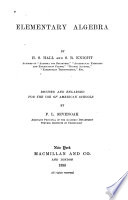 | Henry Sinclair Hall, Samuel Ratcliffe Knight - Algebra - 1895 - 508 pages
...LOGARITHMS. 398. DEFINITION. The logarithm of any number to a given base Is the index of the power to which the base must be raised in order to equal the given number. Thus if ax=N,x is called the logarithm of N to the base a. Examples. (1) Since 34=81, the logarithm... | |
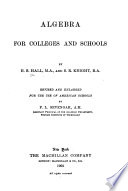 | Henry Sinclair Hall, Samuel Ratcliffe Knight - Algebra - 1897 - 552 pages
...LOGAEITHMS. 425. DEFINITION. The logarithm of any number to a given base is the index of the power to which the base must be raised in order to equal the given number. Thus if a* = N, x is called the logarithm of N to the base a. EXAMPLES. (1) Since 34 = 81, the logarithm... | |
 | John William Bradshaw - 1903 - 76 pages
...told that "the logarithm of a number is the exponent of the power to which a certain number, taken as the ba.se, must be raised in order to equal the given number." The definition is purely formal. Probably the beginner has never seen a proof for the existence even... | |
 | George Lisle - Accounting - 1904 - 526 pages
...is the key to the elementary theory. The logarithm of a given number may be defined as the index of the power to which another number (called the base) must be raised to make it equal to the given number. Thus x is called the logarithm of ax to the base a. Similarly... | |
 | Sir Oliver Lodge - Arithmetic - 1906 - 468 pages
...logarithm of 25 to the base 5. The logarithm of a number is denned as the index of the power to which the base must be raised in order to equal the given number. Thus if we are told that 3 is the logarithm of a thousand to the base ten, it is another mode of stating... | |
 | Edward Rutledge Robbins - Logarithms - 1909 - 184 pages
...its area CHAPTER VI LOGARITHMS PROPERTIES AND PRACTICE 87. The logarithm of a number is the index of the power to which another number, called the base, must be raised, to produce the given number. In the equation 34 = 81, the base is 3, the number is 81-, and the logarithm... | |
| |